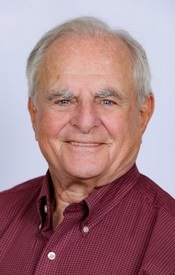
Michael A. Schwartz, dean emeritus of the University of Florida (UF) College of Pharmacy, died March 28, 2024, at age 93 years.

(image courtesy of the
University of Florida
College of Pharmacy)
Schwartz was part of the UF community for more than 40 years. He served as fifth dean of the college of pharmacy, from 1978 to 1996, and he remained on the faculty until last year. According to the college, his accomplishments as dean include successfully implementing the PharmD program, expanding the college’s research capabilities and clinical pharmacy services, and overseeing an exponential increase in funding to support the college’s activities.
Schwartz became an ASHP member in 1968. He served on the Commission on Goals and was a manuscript reviewer for AJHP. His publication record includes basic research on penicillins and, later in his career, articles on pharmacy practice and pharmacy education.
“Mike was an exceptional scientist, educator, and advocate for the advancement of pharmacy practice,” said ASHP Chief Executive Officer Paul W. Abramowitz. “He was a natural leader who inspired excellence in his students and his pharmacy colleagues.”
In 1985, Schwartz and Max Ray, who was then director of ASHP’s professional practice division, coauthored an AJHP report about the relationships between colleges of pharmacy and teaching hospitals.
“Although Mike’s background was in pharmaceutical science, he understood the importance of advanced-level practice sites to the education and training of pharmacy students,” Ray said. “Mike was earnest about building and maintaining strong relationships with practitioners.”
Ray, who first came to know Schwartz in the 1970s, said the two had many conversations over the years about pharmacy and other topics.
“He always had new ideas he was exploring or thinking about,” Ray said. “He had a delicious sense of humor, a quick wit, and an ever-so-slightly irreverent attitude toward bureaucracies of all types. I enjoyed his company, and I will miss him.”
Leslie Hendeles, professor emeritus at the UF College of Pharmacy, began his own career at the college in 1980 after being recruited by Schwartz. He described Schwartz as “one of the great pharmacy deans of our time” as well as a friend and a personal role model for aging.
“He was a tremendous supporter of the development of clinical pharmacy and brought in faculty who not only practiced but also conducted clinical research,” Hendeles said. The college credits Schwartz with shepherding the creation of 21 new faculty positions during his time as dean and expanding the number of pharmacy departments from two to five.
One of Schwartz’s recruits was Charles (Doug) Hepler, distinguished professor emeritus in the college’s pharmaceutical outcomes and policy department. Hepler said Schwartz was a good listener whose strength of character led him to always do what he believed was right.
“I think most people who worked with Mike knew where he stood. On any issue, it was always about what was good for the college and for the profession,” Hepler said.
Hepler said he worked under six deans during his career, and Schwartz was by far the best.
Michael Averill Schwartz was born August 4, 1930, in New York City, New York, to Ralph Schwartz and Minnie (Bezner) Schwartz.
Schwartz attended the Brooklyn College of Pharmacy, earning a bachelor’s degree in 1952. He completed two years of military service from 1952 to 1954, when he was posted as a pharmacist at the Tokyo Army Hospital in Japan.
After returning stateside, Schwartz continued his pharmacy education, receiving a master’s degree from the Columbia University College of Pharmacy in 1956 and a PhD from the University of Wisconsin in 1959. He worked as a senior research scientist for Bristol Laboratories in Syracuse, New York, before accepting an appointment as assistant professor of pharmaceutics at the State University of New York (SUNY) at Buffalo in 1963.
Schwartz was soon promoted to assistant dean and, in 1970, he was named dean of the pharmacy school. That fall, Schwartz and the university’s deans of medicine, dentistry, and health-related professions were appointed to a rural health manpower committee sponsored by the Regional Medical Program for Western New York.
The committee’s work led to the development of a summer externship program that placed students of medicine, pharmacy, nursing, physical therapy, and other health professions at rural sites under the supervision of a preceptor. The program’s goal was to expose the students to rural practice and encourage them to work in rural communities after graduation.
A total of 34 student pharmacists participated in the externship program through 1975, a number exceeded only by medical student externs. More than half of the participants from all disciplines who responded to a survey reported that they had entered rural practice after graduation.
Schwartz resigned from the SUNY deanship in July 1976 and resumed a faculty position.
After 18 years of service, he stepped down from the deanship and, again, returned to teaching. Although Schwartz officially retired in 2003, he continued to teach an annual course on critical thinking skills until last year.
According to UF, Schwartz held advisory roles with the American Association of Pharmaceutical Scientists (AAPS), the American Association of Colleges of Pharmacy, and the American Council on Pharmacy Education, and he was a fellow of the American Pharmacists Association (APhA), AAPS, and the American Association for the Advancement of Science.
His professional honors include the APhA Tyler Prize for Stimulation of Research (1986) and Hugo H. Schaefer Award (1995). He received the Distinguished Alumnus Award from the Arnold and Marie Schwartz College Pharmacy and Health Sciences in 1992. In 2007, he was honored with the University of Wisconsin School of Pharmacy Citation Award.
Schwartz’s survivors include Karan Schwartz, his wife of 32 years; daughters Lori Schwartz and Sharon DeMark; stepdaughter Kirstin Popper; grandchildren David DeMark and Lucille Soble Montney; and great-granddaughter Octavia Montney.
The UF College of Pharmacy has established a memorial fund to honor Schwartz’s legacy. A recording of his April 1 memorial service is available online.








